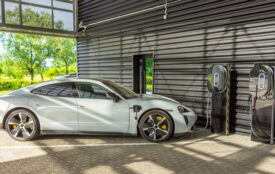Sustainable Transport Concepts in European Cities
Article analyses the benchmarks of the “European Green Capitals” for sustainable urban transport
Sustainable urban transport policy and planning are more important today than ever. Therefore, it is useful to analyse what standard (benchmark) European frontrunner cities represent for an environment-friendly and climate-friendly urban passenger transport. This is what Research Fellow Miriam Müller and Co-Head of the Mobility and Transport Policy Research Unit Prof. Dr. Oscar Reutter, both from the Energy, Transport and Climate Policy Division at the Wuppertal Institute analyse in their research paper about the transport concepts of the European Green Capitals.
Since 2010, the European Commission has been awarding the “European Green Capital Award” to European cities, which develop in a particularly sustainable and environmentally friendly way. In the city competition, European cities present their environment-oriented urban development in twelve topic areas. Over the past ten years, a total of eleven European cities have received the European Green Capital Award for their pioneering role in environmentally friendly urban development, including the German cities of Hamburg (2011) and Essen (2017).
In the article “Benchmark: Climate and environmentally friendly urban passenger transport – the concepts of the European Green Capitals 2010-2020”, the author team evaluates the strategies and measures of the winning cities based on the city applications. They also take into account past developments and the cities’ future goals. The study demonstrates that the cities successfully pursue policy approaches to avoid traffic, to shift car traffic to public transport, cycling and walking and to improve transport efficiency. Examples are: expanded cycling networks, more bus and tram services, 30 km/h speed limits, increased parking fees and the introduction of a city toll. “The cities not only make transport more climate and environmentally friendly, but also their cities more liveable,” Miriam Müller reflects upon the study result and adds “the cities provide good examples that other cities can follow.”
The scientific article was published in English in March 2020 in “World Transport Policy and Practice” (Volume 26.2) and is part of a publication-based dissertation project of Miriam Müller. The paper is available under the following link.








